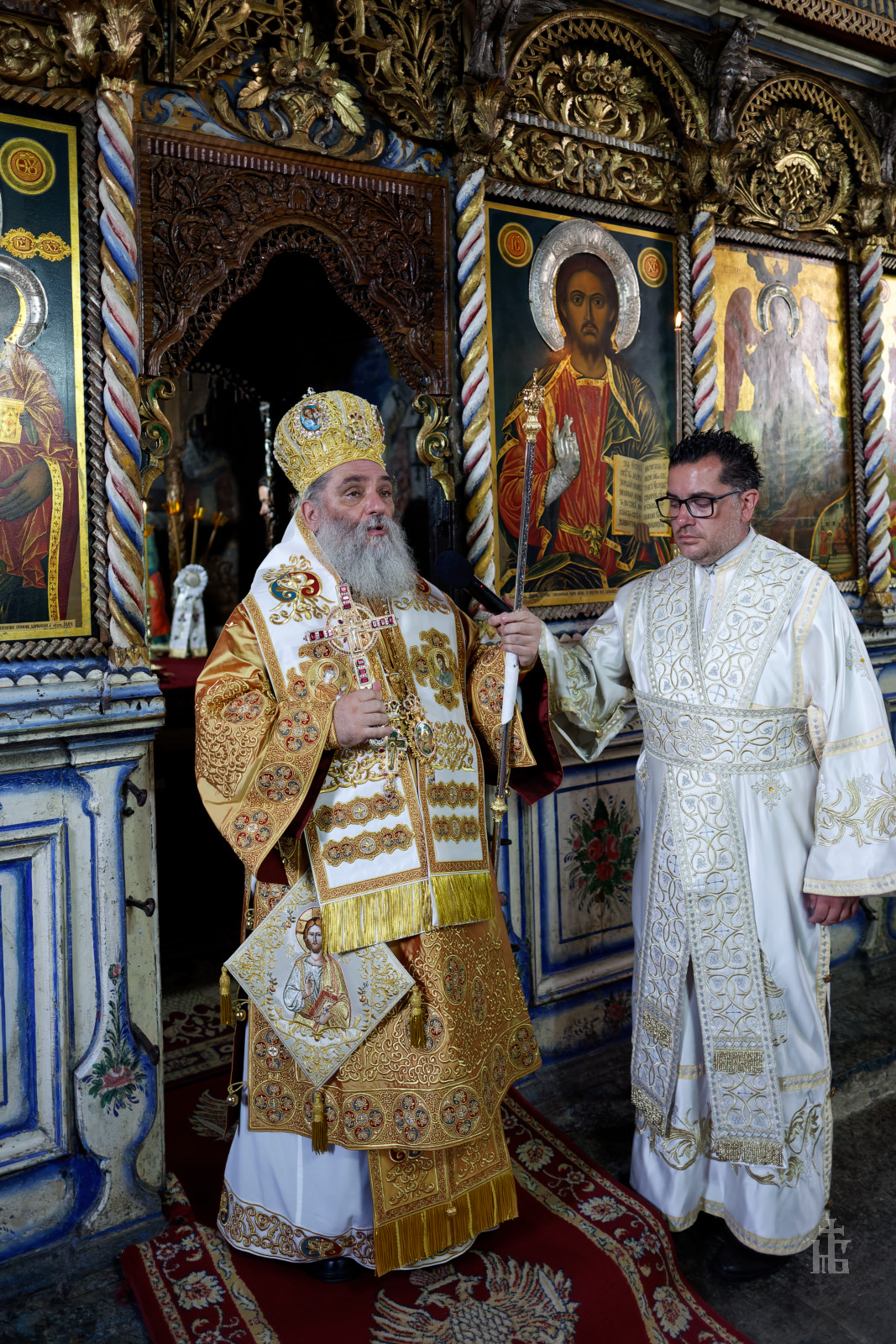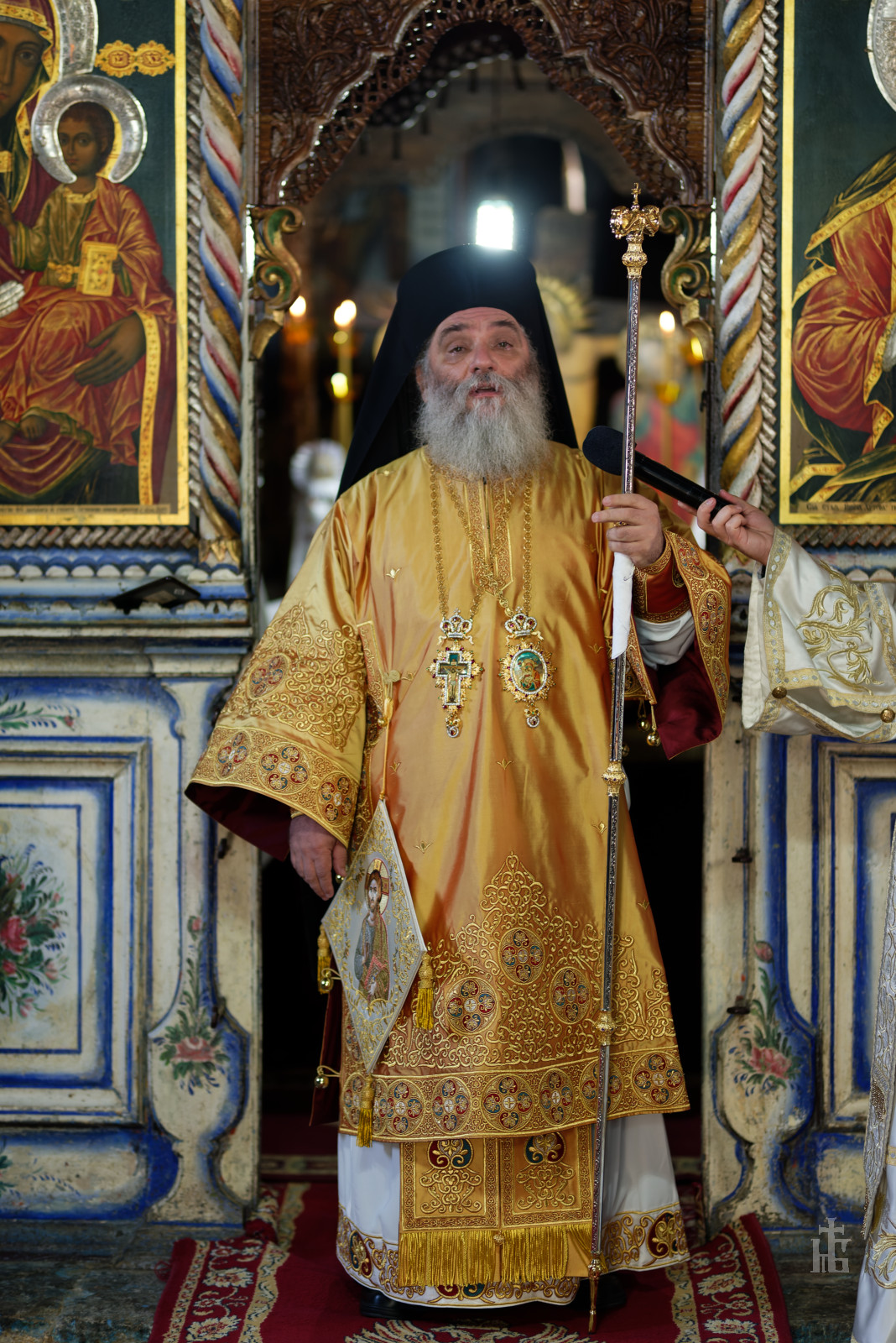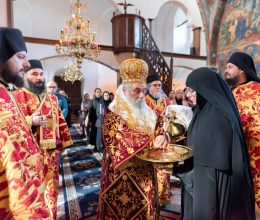Sermon of His Grace, Bishop Partenij of Antania, Abbot of the Holy Monastery of Bigorski, delivered on the Feast of the Prophet Elijah (Ilinden) in the Church of the Great Martyr George the Victorious in the village of Lazaropole, on July 20/August 2, 2023

In the name of the Father, and of the Son, and of the Holy Spirit!
Let us give thanks to God, dear brothers and sisters, that we have once again gathered this year, in this sacred temple of the renowned Mijak village, to celebrate liturgically and communally the memory of the great Old Testament prophet, St. Elijah.
St. Elijah is undoubtedly one of the most significant figures in Holy Scripture, a prophet whose life profoundly impacted both the Old and New Testaments. Filled with a truly extraordinary zeal and faith in God, he played a decisive role in preserving true faith in Israel. For at that time, the people of Judah were the only ones who managed to safeguard the tradition of faith in the one true God and Creator, which had been entrusted to humanity since the days of Adam and Eve.
However, as often happened throughout Old Testament history, the society of Judah during the time of St. Elijah had fallen into great spiritual decline. This occurred when the Israelite king Ahab married the pagan princess Jezebel. She introduced idolatrous worship into the heart of Israel, actively promoting the cults of the false god Baal and the goddess Ashtoreth—whose immoral practices were akin to those inspired by the Greek goddess Aphrodite. This foreign influence posed a grave threat to the Israelites, who had been called to preserve and bear witness to the true faith in the one God—a faith that would be fully revealed with the coming of the Messiah, Christ, who was foretold by St. Elijah and all the holy prophets. Christ revealed the fullness of God’s truth to the world and liberated humanity from the demonic tyranny that had governed pagan religions and societies, inspired by evil spirits.
God chose St. Elijah because of his fiery zeal for truth and righteousness, entrusting him with the mission to restore the wayward people of Israel to the path of true faith. The prophet successfully accomplished this mission, empowered by great grace from above, performing many signs and wonders through the strength of his prayer to the Lord. Under his spiritual guidance, the faith of the Israelites was restored and strengthened. According to God’s providence, Elijah was taken up alive to Heaven in a chariot of fire. The Lord preserved him, so that at the appointed time, when the world falls away from revealed truth and returns to the darkness of paganism, Elijah will come again to preach with zeal. When that time arrives, the Creator of this beautiful world—now deeply corrupted by sin—will return with fire to renew it, creating “a new heaven and a new earth, where there will be no more death, neither sorrow, nor crying, nor pain” (Revelation 21:1,4).
St. Elijah, then, is alive, taken to Heaven, and awaits the moment when God will send him back to Earth to reveal the Antichrist to the world. But you must understand that the Antichrist is not only the ultimate embodiment of evil foretold in the Book of Revelation. Every person who denies that Jesus of Nazareth is the Son of God—crucified on the Cross and risen in glory—is, in a sense, an antichrist. Throughout history, from the time of Christ until now, there have been many antichrists, not only individuals but also entire religions that embody the spirit of the Antichrist by rejecting the fundamental truth about Christ—that He is the Son of God and the Savior of the world, who died for our salvation and rose from the dead.

That St. Elijah is truly great before the Lord is further evident from the fact that he appeared alongside the Prophet Moses during Christ’s Transfiguration on Mount Tabor. Before entering His Passion and Crucifixion, the Savior revealed a glimpse of His divine glory to His three disciples—Peter, James, and John—so that their faith would be strengthened, and they would not fall into despair at the sight of His suffering on Golgotha. It was no coincidence that these two mighty prophets, Moses and Elijah, appeared at this radiant event, conversing with Christ and bearing witness to His divinity and the truth of His mission.
From this example and the other events in St. Elijah’s life, dear brothers and sisters, we learn that the most essential thing for both individuals and societies is what they believe in and how they believe. A person’s worldview and behavior are rooted in their beliefs. There is a great difference between believing in something vain, false, fleeting, or uncertain, and believing in the revealed truth that the Creator has lovingly made known throughout history. In the Old Testament, God revealed Himself through righteous men and prophets, like today’s celebrated saint. Later, He spoke to us directly through the incarnation of His Son, the Word of God, about whom the last of the prophets, the glorious St. John the Baptist, testified: “Behold! The Lamb of God who takes away the sin of the world!” (John 1:29).
Our God is a personal God, and therefore we build a personal relationship with Him—He speaks to our hearts with mercy and love. When someone’s worldview is grounded in this revealed faith, their character will reflect goodness, and their actions will be just and responsible. Similarly, when most individuals in a society embrace such faith, its laws will align with their moral values. Conversely, when there is moral and ethical decay in a society, the state apparatus begins to legislate immorality as a right.
Christianity began to spread within a deeply immoral society, amidst numerous pagan beliefs and perverse customs considered entirely normal at the time, in a state that breathed hatred toward Christ’s followers. Spiritually, the Romans and other pagan nations were deeply deluded—lost in destructive religions, polytheism, idolatry, impure rituals, and bloody sacrifices. Yet, in the midst of such an unfavorable spiritual environment, the Apostles, filled with unbreakable faith, a zeal like that of St. Elijah, and inexpressible love for Christ—even at the cost of their own lives—fearlessly, tirelessly, and patiently sowed the Gospel seed of salvation.
What began as a “Jewish heresy,” as it was initially called in Rome, constantly threatened by persecution and torture, grew over time into a powerful force that conquered the Roman Empire. But this victory was not achieved outwardly, through the sword and bloodshed, but from within—through inner transformation. Rome and the entire civilized world of that time bowed lovingly before Christ the Savior. Mighty emperors and military leaders, along with ancient philosophers, worshipped Him as God. Christ was equally received by decadent Romans and educated rhetoricians. Observing the sacrificial lives of Christians, many concluded that Christ was the One they had been waiting for—the fulfillment of human longing and the joy of the soul.
Among the truths that Christianity revealed to the world was that the family, as the most important social institution, thrives only when marriage is a covenant between one man and one woman. Before this, even among the most civilized nations—and even among the Jews—this was not the case. Polygamy was considered normal, and women were often treated as inferior. Thus, dear brothers and sisters, the beautiful family traditions that our parents, grandparents, and ancestors passed down to us, deeply nourished by faith in the Gospel, are a gift of Christian civilization.
Unfortunately, the world today is in a deep spiritual crisis. We hear, read, and see how churches across the globe—especially in Western Europe—are closing, monasteries are being turned into museums or other institutions, and people have grown indifferent and cold toward the Christian faith that once transformed the tribes of Europe into advanced civilization. Europe, it must be said, was built upon Christianity—created and enriched by it. A healthy society is founded upon the Christian family. Recall that the first miracle Christ performed, as recorded in the Gospel, was at a wedding in Cana of Galilee, underscoring the essential importance of marriage. Yet now, as Christians abandon their faith and the good works that follow it, churches are closing, while immorality and melancholy grow.
When humanity declares a kind of freedom without God, it returns to the old slavery—just as in the pre-Christian era. There is nothing new under the sun. Primitive ways and paganism have reemerged. And the first casualty of this regression is the most sacred institution—the Christian family. Look at the new definitions of marriage being proposed today—attempts to redefine what God Himself established and ordained! What has unbelief in God led to? The complete distortion of the human image and the degradation of human dignity. It would even be an insult to animals to say that we are becoming like them, for animals, too, live by laws set by God and follow them strictly, while we, as humans, no longer seem to adhere to any order or moral structure.
God loves us above all creation; He made us in His image and likeness, endowed us with dominion, and gave us free will. Yet, instead of choosing what is good, bright, and true, humanity abuses this freedom to indulge in selfish and base passions.
Why do we say that Christianity is the guardian of marriage? First and foremost, marriage is a Christian institution—a holy mystery within the Church, a covenant between one man and one woman. The husband vows to remain faithful and serve his wife in love, and the wife does the same for her husband. For this covenant to endure, both spouses must live according to Christian teachings, preserving themselves in chastity. Christianity teaches people, above all, to restrain themselves from sin, evil, and destructive passions. Particularly in Orthodoxy, which preserves the authentic Christian teaching, great care is given to asceticism—the discipline of restraint. The Orthodox Church continually calls and teaches us to practice restraint.
This is why the Church has established fasting on Wednesdays and Fridays, as well as during the four major fasting periods. When a fast begins, we say that we will refrain from certain foods—not just physical nourishment, but also from the evils within us, from selfishness, from judgment, and from the idleness we often indulge in on social media. The Church teaches us to practice restraint and to direct our minds and hearts toward the Heavenly Homeland—the Kingdom of God.
Living in the time of the New Covenant, we know well that we are children of the Living God and that our eternal homeland is in Heaven. This is what our ancestors, our grandparents, and forebears knew and passed down to us. They may not have read as much as we do today, but what they learned in church, they applied in their daily lives. Today, we have many opportunities for education and access to information, but true education means something far greater. The very word “education” implies acquiring the image of God—learning how to become godlike, striving for deification. In contrast, modern education has been reduced to the mere accumulation of information for material gain.
Our grandparents and ancestors came to church to draw wisdom and to gain eternal life. Those who could read would teach others the Holy Scriptures and the traditions of Orthodoxy, but most importantly, they taught how to be spiritually healthy and strong—Christians who strive to be what God desires us to be, people who fill the Kingdom of Heaven.
My dear ones, this is precisely what St. Elijah did: with great strictness, in accordance with the spirit of his time, he called the people of Judah back to the correct knowledge of God. Today, he sends us the same message and prays for our spiritual well-being. For we, the Orthodox, bear a great responsibility and guilt if the world strays onto the wrong path. Rather than pointing fingers at those who have lost their way and do not know God, we must turn our gaze inward and ask ourselves: are we truly Christians, in both faith and deeds?
Sadly, we must acknowledge that the Orthodox Church today is facing a severe crisis. Many among the clergy openly display their weaknesses, overcome by the desire for glory and power—something particularly harmful to the Church. However, this situation should not discourage anyone from walking the blessed path, for you well know that we, too, who serve in the clergy, are human and struggle with weaknesses. Some succeed more in overcoming these weaknesses, others less, but what matters is that we all strive. It is Christian not to be scandalized by the behavior of others but to correct our own lives according to the teachings of the Prophets, the preaching of the Apostles, the witness of the Martyrs, and the example of the Saints—and ultimately, as our many ancestors would have wanted, who surely have boldness before God and grieve over our unchristian conduct.
Whenever I come to this village, I love speaking about our ancestors, for their piety profoundly moves and inspires me. As I read and listen to the history of this village and the renowned individuals who came from here, I see many parallels with the Prophets, the Martyrs, and the Saints. These great figures were always ready to sacrifice their lives for Christ. They left everything for His sake. When danger loomed over their homes—especially over their churches—they were not afraid, for they held nothing in this world too dear. Even when they were persecuted and forced to relocate, they built new churches. From whatever could be salvaged from the old, burnt churches, they created new works—new places of worship. For them, Christ was paramount—prayer, worship, and communion with Him were of utmost importance.
Let us strive to emulate them, dear brothers and sisters, so that we may bring them joy and become a blessing to future generations. May you be blessed, and may we proudly celebrate the 120th anniversary of the heroic Ilinden Uprising! Eternal memory to all who fell defending our faith and our homeland!
May the prayers of the Holy Prophet Elijah be with all of us, that we may become ever more zealous in our beautiful faith, as Christians worthy of our ancestors.
Amen!
















